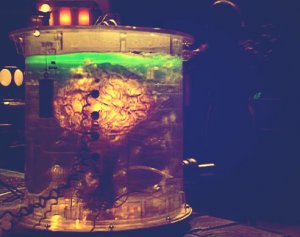Penfield’s classic brain experiments of the 1930s inspired a certain famous riddle, long since dubbed “brains in vats” by philosophy students. It goes like this: You think you’re sitting there reading this post. Actually, you could be a disembodied brain in a laboratory somewhere, soaking in a vat of nutrients. Electrodes are attached to the brain. And a mad scientist feeds it with a stream of electrical impulses that exactly simulates the experience of reading this post!
Let’s expand a little on the anecdote to see the full force of this. At some indistinct past time, while you were sleeping, your brain was removed from your body. Every nerve was severed by skilled surgeons and attached to a microscopic electrode.
Each of these millions of electrodes is hooked to a machine that produces tiny electrical pulses just as the original nerves did.
When you read a book and you turn the page, it feels like a page because the electrodes send your brain exactly the same nerve impulses that would have come from real fingers grasping a real page. But the page and the fingers are illusion.
Bringing the book closer to your face makes it look bigger; holding it at arm’s length makes it look smaller … 3-D perspective is simulated by judiciously adjusting the voltages of the electrodes attached to the stump of the optic nerve.
If, right this instant, you can smell fried potatoes and hear Rock music in the background, that is part of the illusion too. You can pinch yourself and receive the expected sensation, but it will prove nothing. In fact, there’s no way you can prove that this isn’t so. How, then, can you justify your belief that the external world exists?
 Dreams and Evil Geniuses
Dreams and Evil Geniuses
To anyone with a skeptical turn of mind, the brains-in-vats paradox is both appealing and infuriating. There is something fascinating about the demonstration that, just possibly, everything you know is wrong!
Despite the influence of Penfield and other brain researchers, doubts about the reality of the world are not a uniquely modern malaise. Brains-in-vats is simply a stronger version of older riddles asking “How do you know this isn’t all a dream?”
Best known of these is the Chinese tale of Chuang-tzu, dating from the fourth century B.C. Chuang-tzu was the man who dreamt he was a butterfly, then awoke to wonder if he was a butterfly dreaming he was a man.
And of course there’s the version of Descartes’ “Evil Demon” thought experiment. Where he asks whether the world we perceive is an illusion. Given the possibility that the world is an illusion, all we can know for sure is that our thoughts exist: “I think therefore I am.”



